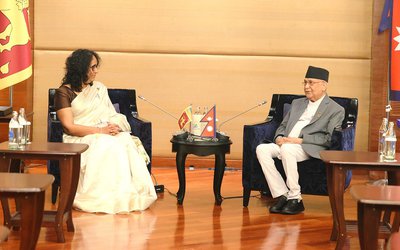In 1983, a Korean Airlines Boeing 747 en route from New York to Seoul was shot down by a Soviet fighter jet killing all 269 passengers aboard. Despite clear evidences, the Soviet government refused to take any responsibility for the attack. It admitted to shooting down the plane only after intense pressure claiming that the plane was on a ‘spy mission’. While the Soviet downfall came after eight years of the crash, the incident is widely believed to have played a vital role in bringing an end to more than seven decades of communist rule in the country.
The downing of the Malaysian Airlines flight MH17 last week evoked the memory of the 1983 incident in many ways. Although it is yet to be determined who was responsible for the downing, the needle of suspicion has been pointed towards Russia. Quite like the 1983 incident, the MH17 disaster came amidst mounting Western sanctions and the subsequently tarnished image of Russia. While it is unlikely that Russia will meet the fate of the USSR, if held responsible, it is sure to create serious repercussions for the country and dangerous geopolitical ramifications in the entire world.
One of the first upshots of the disaster is going to be an upsurge in tensions between the West particularly the United States (US) and Russia. The Malaysian Airlines crash came at a time when relations between the two countries had already begun to sour. Just hours earlier, the US had imposed fresh sanctions against Russia for its refusal to retract on its intervention in Ukraine. This was the second such sanction slapped by the US; the first one coming after the Crimean occupation in March. The fresh sanction was expected to strike a huge blow to Russia’s already suffering economy, defence and energy sectors.
Although the US stopped short of blaming Russia directly for the downing of the MH17 flight, it indirectly pointed fingers at Kremlin saying that the attack was made from territory controlled by the Moscow-backed rebels and added that whoever did it, would not have done it without heavy military support. In turn, Moscow slammed Washington for making pre-assumptions about the disaster without waiting for a full investigation. President Obama has now high chances of stepping up the US sanctions inflicting more damage to his Russian counterpart Putin. It might also lead to European countries like Germany, who had taken a milder stance against Russia over Ukraine crisis, to reconsider their decision. The ensuing conflict is almost certain to turn Ukraine into a battlefield between the West and Russia. The US is likely to intensify its existing support to Kiev even as Russia is sure to bolster the rebels.
The increasing tension with the US will also make Russia court new allies in its backyard. The Russia–China relationship is particularly expected to gain mileage. Earlier in an obvious reference to the sanctions, China's top envoy to Germany had warned the West against punishing Russia saying that it could trigger a dangerous chain reaction which it said would be difficult to control. China, quite expectedly, was one of the few countries which did not point fingers at Russia for the crash. Instead an article in the state-owned news agency Xinhua echoed Russian President Vladimir Putin’s opinion that the ultimate responsibility of the crash lied with Ukraine as it had taken place in their airspace. With Russia facing wide spread isolation, the crash is now expected to bring the once staunch arch communist rivals even closer. Signs of growing closeness between the two countries have already been seen in the form of a $ 400 billion of gas deal, which came soon after the first set of US sanctions.
Not just the East, Putin is also expected to strengthen his relations with the left-oriented Latin American countries, where he made a trip recently and where he enjoys popularity. This is sure to irk the US who will strongly disapprove of Russia playing games in its backyard. Amidst growing isolation by the West, Putin also managed to gain support from fellow BRICS members during the recent summit in Brazil where the member countries refrained from criticizing Russia’s actions in Ukraine. Following in China’s footsteps, Putin even managed to hold meetings with Indian Prime Minister Narendra Modi to talk about a $40 Billion Russia – India gas line deal. It remains to be seen how India, which is seeking a strategic partnership with the US, will react to the situation.
According to a study conducted by the Higher School of Economics in St. Petesburg, high ranking Russian bureaucrats and politicians have been growing largely antagonistic towards the US. The Americans share similar sentiments. At a time when the gap between the two sides have been widening as never before in the recent past, the MH17 downing will undoubtedly bring major changes in the dynamics of global politics. Although the US toned down their stance at a later stage saying that they believed the plane had been mistakenly shot down, the shape of the changes will be keenly watched across the world.
- Ukrainian Crisis And The World (Dis)Order
- Apr 22, 2022
- China’s Cautious Steps In The Graveyard Of Empires
- Aug 18, 2021
- Foreign Aid On The Fence!
- Aug 08, 2021
- Communist Party of China centenary celebrations Reading between the lips
- Jul 14, 2021
- Second Wave Of Covid-19 In India: Deadly Blow To The Economy
- Jun 23, 2021















